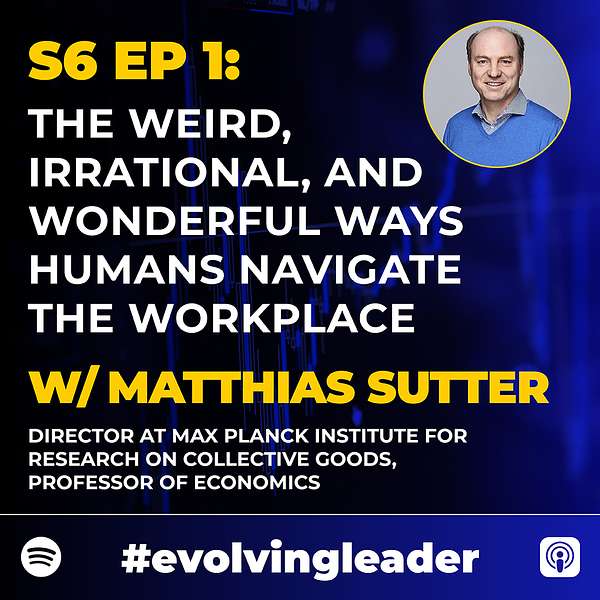
The Evolving Leader
The Evolving Leader Podcast is a show set in the context of the world’s ‘great transition’ – technological, environmental and societal upheaval – that requires deeper, more committed leadership to confront the world’s biggest challenges. Hosts, Jean Gomes (a New York Times best selling author) and Scott Allender (an award winning leadership development specialist working in the creative industries) approach complex topics with an urgency that matches the speed of change. This show will give insights about how today’s leaders can grow their capacity for leading tomorrow’s rapidly evolving world. With accomplished guests from business, neuroscience, psychology, and more, the Evolving Leader Podcast is a call to action for deep personal reflection, and conscious evolution. The world is evolving, are you?
A little more about the hosts:
New York Times best selling author, Jean Gomes, has more than 30 years experience working with leaders and their teams to help them face their organisation’s most challenging issues. His clients span industries and include Google, BMW, Toyota, eBay, Coca-Cola, Microsoft, Warner Music, Sony Electronics, Alexander McQueen, Stella McCartney, the UK Olympic system and many others.
Award winning leadership development specialist, Scott Allender has over 20 years experience working with leaders across various businesses, including his current role heading up global leadership development at Warner Music. An expert practitioner in emotional intelligence and psychometric tools, Scott has worked to help teams around the world develop radical self-awareness and build high performing cultures.
The Evolving Leader podcast is produced by Phil Kerby at Outside © 2024
The Evolving Leader music is a Ron Robinson composition, © 2022
The Evolving Leader
The Weird, Irrational, and Wonderful Ways Humans Navigate the Workplace with Matthias Sutter
Economics has often been accused of making inferences about human behaviour without any real understanding of how we actually make decisions, choose between options or act against our stated interests. Behavioural economics combining economics and psychology started to accelerate its development in the 1980s, but its roots can be traced back to the 18th century economist Adam Smith. In this episode of The Evolving Leader podcast, co-hosts Jean Gomes and Scott Allender talk to Matthias Sutter, one of the world’s leading behavioural economists about his (often) counter-intuitive findings, and how they can help leaders create fairer, more inclusive organisations.
Behavioral Economics for Leaders (Matthias Sutter, 2023)
www.youtube.com/@evolvingleader
3.10 Give us a summary of your journey as an economist and the areas that you are most intrigued and excited about
5.11 How do you approach this work and how is this field evolving?
7.05 In your book your write about how economic outcomes are shaped by hidden biases. Can you unpack what's going on there?
11.13 Can you share some of your findings around the value of these social skills and how they translate into financial benefits for organisations?
14.24 What's the missing convincing component that we need to tap into?
17.03 You have said that when you are trying to find a job, it's the weaker connections in your social network that are most important. Why is that?
18.37 Something else you point out is that having more women in a start-up is a predictor of longevity. Tell us about this
21.32 What happens when companies become more transparent with salaries?
25.34 There are parts of the world that require transparency. What are some insights that will help leaders manage that double edged sword?
27.36 You said that employees who don't support company mission statements are 50% less productive. Can you unpack that?
31.18 Moving to the need for quotas to encourage more gender equality. Why do we need quotas?
34.54 The underlying assumption is that being competitive is a core part of being a good leader, but you're saying that there is more to it than that
37.01 Your research suggests that women leaders can earn more revenue per employee when they are on the board. Can you elaborate?
39.57 What have you learnt about trust?
44.43 Do you have any other insights or advice on how leaders might build or accelerate a sense of trust in their teams?
47.14 Can we talk about decision making and money?
50.55 Can we talk about your research into teenager's and children's decision making? What are you doing in that area?
53.33 What's the most powerful that helps children and teenagers to build that muscle of differed gratification?
55.09 What have you learnt on what encompases or inhibits ethical behaviour amongst individuals and teams?
Social:
Instagram @evolvingleader
LinkedIn The Evolving Leader Podcast
Twitter @Evolving_Leader
YouTube @evolvingleader
The Evolving Leader is researched, written and presented by Jean Gomes and Scott Allender with production by Phil Kerby. It is an Outside production.

